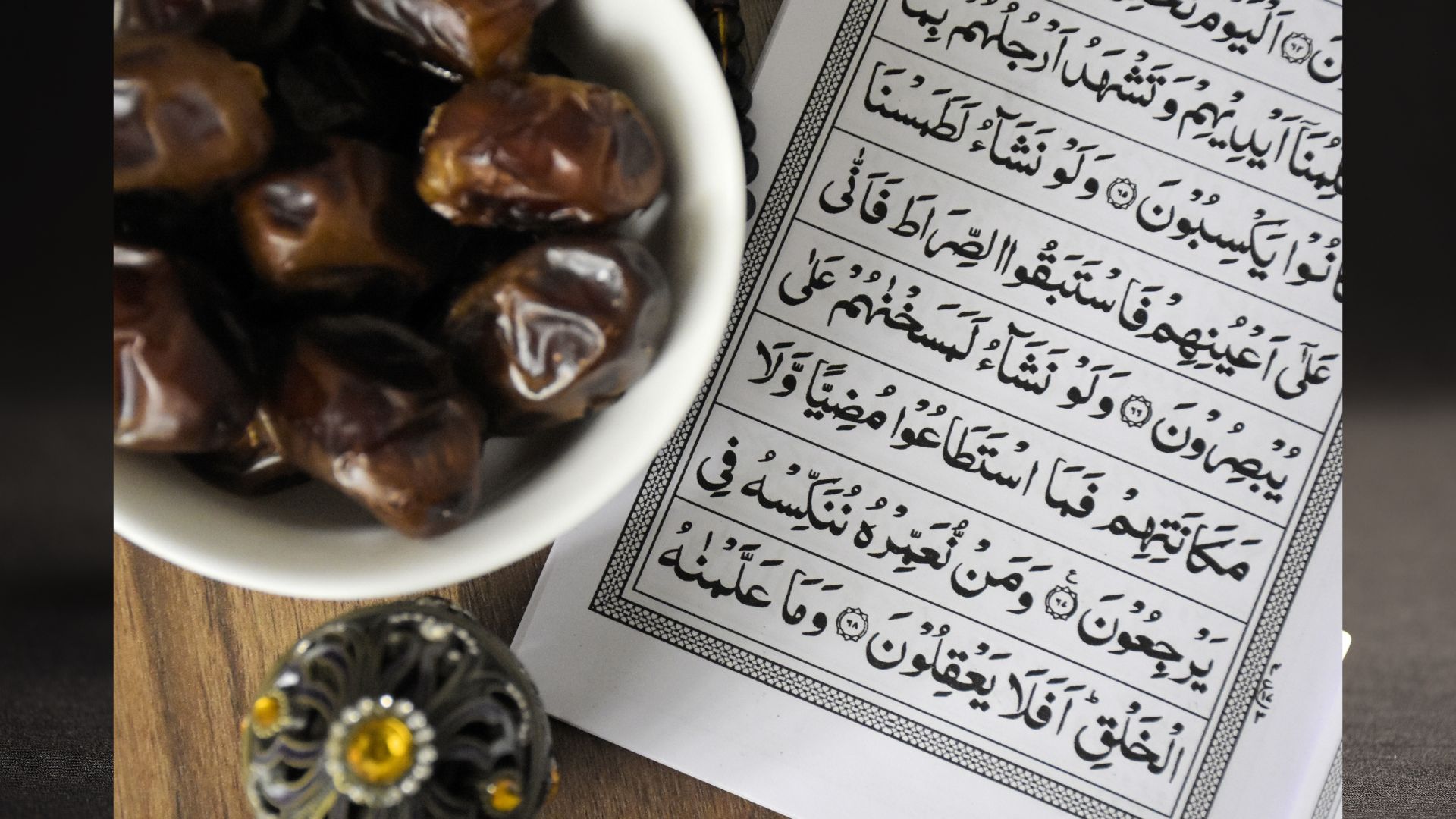Honouring Allah (ﷻ) means following His guidance and love for Allah (ﷻ) means to obey His commands.
All praise is due to Allah; we praise Him; seek His help and ask His forgiveness. We seek refuge in Allah from the evil of our souls and our deeds, for whomever Allah has guided, none can lead astray, and whomever Allah has allowed to go astray, none can guide. I bear witness that there is no God worthy of worship besides Allah, who is alone without a partner, and I bear witness that Muhammad is His slave and Messenger.
﷽
1. Honouring Allah (ﷻ) by acknowledging His Greatness.
”What is the matter with you, that [you fear not Allâh (His punishment), and] you hope not for reward (from Allâh or you believe not in His Oneness).” [Surah Nuh : 13]
Mā lakum lā tarjūna lillāhi waqārā.
مَّا لَكُمۡ لَا تَرۡجُونَ لِلَّهِ وَقَارً۬ا (١٣)
2. Honouring the symbols of Allah (ﷻ).
”That (Manâsik prescribed duties of Hajj is the obligation that mankind owes to Allâh), and whoever honours the sacred things of Allâh, then that is better for him with his Lord.” [Surah Al Hajj : 30]
Shaykh Uthaymeen (رضي الله عنه) commented: ”Hajj (The pilgrimage every able Muslims must make to Makkah once in their lifetime) is one of the best forms of worship and is one of the most sublime deeds, for it is one of the pillars of Islam with which Allah sent Muhammad (ﷺ). A servant’s religion is incomplete without it.; Worship is only acceptable if it meets the following two criteria:
One devoted it to Allah alone, desiring the Hereafter (being in a state of Ikhlas, i.e. purely for Allah and seeking the Hereafter). It cannot be done with the intention of being seen by others (Riyaa’ i.e. minor Shirk) or for worldly gain.
One follows the Prophet’s example, in words and deeds. This cannot be accomplished except through knowledge of the Sunnah.”
3. Honouring and respecting those who obey Allah (ﷻ).
Al-Ash’ari narrated, that the Prophet (ﷺ) said: “Part of respect for Allah is to show respect to an old Muslim and to someone who knows the Qur’an, as long as he does not go to excess in it nor turn away from it, and to respect a just ruler.” [Abu Dawud and Al-Adab Al-Mufrad by al Bukhari, Book 18, Hadith 357, classed as Hasan by Al Albani]
4. Knowing the rights of Allah (ﷻ).
Feeling shy before Allah and fearing Him in private and public. Allah (ﷻ) says:
”They may hide (their crimes) from men, but they cannot hide (them) from Allâh, for He is with them (by His Knowledge), when they plot by night in words that He does not approve, And Allâh ever encompasses what they do.” [Surah An Nisa : 108]
Yastakhfūna mina an-nāsi walā yastakhfūna mina Allāhi wahuwa maʿahum idh yubayyitūna mā lā yarḍā mina al-qawl. Wa kāna Allāhu bimā yaʿmalūna muḥīṭan
سۡتَخۡفُونَ مِنَ ٱلنَّاسِ وَلَا يَسۡتَخۡفُونَ مِنَ ٱللَّهِ وَهُوَ مَعَهُمۡ إِذۡ يُبَيِّتُونَ مَا لَا يَرۡضَىٰ مِنَ ٱلۡقَوۡلِۚ وَكَانَ ٱللَّهُ بِمَا يَعۡمَلُونَ مُحِيطًا (١٠٨)
Submitting to the rulings of Allah (ﷻ) and His Messenger (ﷺ), and adhering to the teachings of Islam.
”It is not for a believer, man or woman, when Allâh and His Messenger have decreed a matter that they should have any option in their decision. And whoever disobeys Allâh and His Messenger, he has indeed strayed in to a plain error.” [Surah Al Ahzab : 36]
Wa mā kāna limu’minin wa lā mu’minatin idhā qaḍā Allāhu wa rasūluhu amran an yakūna lahumu al-khiyaratu min amrihim. Wa man yaʿṣi Allāha wa rasūlahu faqad ḍalla ḍalālan mubīnan.
وَمَا كَانَ لِمُؤۡمِنٍ۬ وَلَا مُؤۡمِنَةٍ إِذَا قَضَى ٱللَّ هُ وَرَسُولُهُ ۥۤ أَمۡرًا أَن يَكُونَ لَهُمُ ٱلۡخِيَرَةُ مِنۡ أَمۡرِهِمۡۗ وَمَن يَعۡصِ ٱللَّهَ وَرَسُول ۥ فَقَدۡ ضَ لَّ ضَلَـٰلاً۬ مُّبِينً۬ا (٣٦)
”It is not for a believer, man or woman, when Allâh and His Messenger have decreed a matter that they should have any option in their decision. And whoever disobeys Allâh and His Messenger, he has indeed strayed in to a plain error.” [Surah Al Ahzab : 36]
Wa mā kāna limu’minin wa lā mu’minatin idhā qaḍā Allāhu wa rasūluhu amran an yakūna lahumu al-khiyaratu min amrihim. Wa man yaʿṣi Allāha wa rasūlahu faqad ḍalla ḍalālan mubīnan.
وَمَا كَانَ لِمُؤۡمِنٍ۬ وَلَا مُؤۡمِنَةٍ إِذَا قَضَى ٱللَّهُ وَرَسُولُهُ ۥۤ أَمۡرًا أَن يَكُونَ لَهُمُ ٱلۡخِيَرَةُ مِنۡ أَمۡرِهِمۡۗ وَمَن يَعۡصِ ٱللَّهَ وَرَسُولَهُ ۥ فَقَدۡ ضَلَّ ضَلَـٰلاً۬ مُّبِينً۬ا (٣٦)
Narrated Anas: Allah’s Messenger (ﷺ) said, “Whoever possesses the (following) three qualities will have the sweetness of faith: The one to whom Allah and His Apostle becomes dearer than anything else; .. ” [Sahih al-Bukhari 6941, Vol. 9, Book 85, Hadith 74]
Ibn al-Qayyim (رحمه الله) said: ”Love on the basis of servitude to Allah (ubudiyah) is the noblet type of love, and this is purely the right of llh over his slaves.” [Rawadatul Muhibbin]
Constantly remembering Allah and thanking Him for blessings.
Therefore remember Me (by praying, glorifying,). I will remember you, and be grateful to Me (for My countless Favours on you) and never be ungrateful to Me. [Surah al Baqara : 152]
Fadhkurūnī adhkurkum wa ashkurū lī wa lā takfurūn.
فَٱذۡكُرُونِىٓ أَذۡكُرۡكُمۡ وَٱشۡڪُرُواْ لِى وَلَا تَكۡفُرُونِ (١٥٢)
Being content with Allah (ﷻ) as one’s Lord, Islam as one’s religion, and Muhammad as one’s Prophet.
Ibn al-Qayyim (رحمه الله) said: Love on the basis of servitude to Allah (Ubudiyah – a state of complete submission, devotion, and obedience) is the noblest type of love, and this is solely the right of Allah over His slaves. [Rawadatul Muhibbin]
Constantly remembering Allah and thanking Him for the blessings. Allah (ﷻ) says:
”Therefore remember Me (by praying, glorifying,). I will remember you, and be grateful to Me (for My countless Favours on you) and never be ungrateful to Me.” [Surah al Baqara : 152]
Fadhkuroonee adhkurkum washkuroo lee wa laa takfuroon.
فَٱذۡكُرُونِىٓ أَذۡكُرۡكُمۡ وَٱشۡڪُرُواْ لِى وَلَا تَكۡفُرُونِ (١٥٢)
Not attributing evil to Allah (ﷻ) because the Prophet (ﷺ) said:
”All goodness is in Your hands, and evil is not attributed to You.” [Sahih Muslim, Book 2, Hadith 268, Narrated ‘Ali bin Abi Talib (رضي الله عنه)]
Constantly seeking His forgiveness and repenting to Allah (ﷻ) from sins.
”And all of you beg Allâh to forgive you all, O believers, that you may be successful.” [Surah al Nur : 31]
Wa tooboo ilallaahi jamee’an ayyuhal mu’minoona la’allakum tuflihoon.
وَتُوبُوٓاْ إِلَى ٱللَّهِ جَمِيعًا أَيُّهَ ٱلۡمُؤۡمِنُونَ لَعَلَّكُمۡ تُفۡلِحُونَ (٣١)
An Nawawi (رحمه الله) said: Everyone who commits a sin must hasten to repent from it, for repentance is one of the dues of Allah. [Riyad-us-Saliheen]
Thinking positively of Allah (ﷻ).
It was narrated that Jabir said: “I heard the Messenger of Allah (ﷺ) say: ‘No one of you should die except thinking positively of Allah.” [Sahih Ibn Majah, Vol. 5, Book 37, Hadith 4167]

Bibliography and History of the sources
How to Perform the Hajj by Shaykh Muhammad ibn Saalih al Uthaymeen
Bulūgh al-Marām by Imām Ibn Hajar
Al-Adab Al-Mufrad by al Bukhari
Rawadatul Muhibbin by Ibn Qayyim
Tarbiyyah Islamiyah by Zad Academy
Interpretation of the Meaning of the Noble Qur’an in the English Language by Dr. Muhammad Muhsin Khan | Dr. Muhammad Taqi-ud-Din Al-Hilal










 The Rights of Allah over people
The Rights of Allah over people Rising Righteous - How the First Nine Months Shape the Rest of One's Life
Rising Righteous - How the First Nine Months Shape the Rest of One's Life









